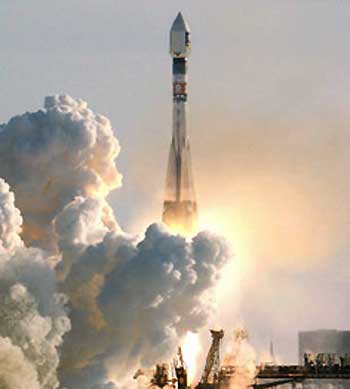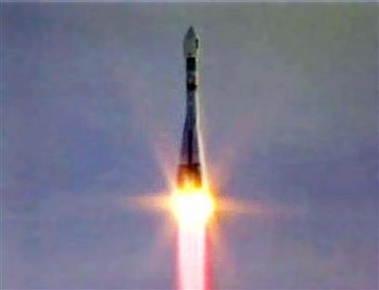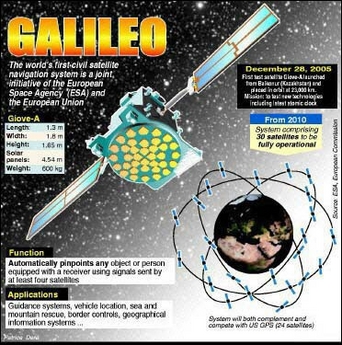|
European satellite launch challenges GPS
(Reuters)
Updated: 2005-12-29 08:58
The European Union launched its first Galileo navigation satellite on
Wednesday, moving to challenge the United States' Global Positioning System
(GPS).
Russian space agency Roskosmos said the 600 kg (1,300 lb) satellite named
Giove-A (Galileo In-Orbit Validation Element) went into its orbit 23,000 km
(15,000 miles) from the earth after its launch on a Soyuz rocket from the
Baikonur cosmodrome in the middle of Kazakhstan's steppe.

A Russian Soyuz rocket carrying a Galileo
satellite blasts off from Baikonur cosmodrome in Kazakhstan December 28,
2005.[Reuters] | "The launch of Giove is the proof that Europe can deliver ambitious projects
to the benefit of its citizens and companies," said EU Transport Commissioner
Jacques Barrot in a statement.
The 3.6 billion-euro ($4.27-billion) Galileo programme, due to go into
service in 2008 and eventually deploy 30 satellites, may end Europe's reliance
on the GPS and offer a commercial alternative to the GPS system run by the U.S.
military.
"Radio-navigation based on Galileo will be a feature of everyday life,
helping to avoid traffic jams and tracking dangerous cargos," Barrot said.

A video grab released by the European Space
Agency (ESA) shows a Soyuz rocket carrying a Galileo satellite launching
from the Baikonur cosmodrome in Kazakhstan December 28, 2005.
[Reuters] | The GPS is currently the only
worldwide system offering services ranging from driver assistance to
search-and-rescue help. Critics say its services for civilians offer less
precision than those for military or intelligence purposes.
Galileo's accuracy in positioning is to be one meter (3 feet) or less, while
the GPS's precision is more than 5 metres.

Graphic of Galileo civil navigation system.
[AFP] | EU officials also say Galileo would never
be switched off for strategic reasons, which might be the case with the GPS.
If successful, the satellite will mark a major step in Europe's biggest ever
space programme, involving firms such as European aerospace giant EADS, France's
Thales and Alcatel, Britain's Inmarsat, Italy's Finmeccanica and Spain's AENA
and Hispasat.
SYMBOL OF SUCCESS?
Galileo's critics say it is an unnecessary exercise in political grandeur,
which is unlikely to be commercially viable, as GPS is free of charge and will
soon be upgraded.

The Galileo navigation satellite system is
pictured in Baikonur, Kazakhstan, on December 15.
[AFP/file] | But advocates point to its future
role in Europe's new air-traffic system and plans to integrate it with mobile
telephone services, which should provide ample business opportunities.
Like aircraft Airbus, Galileo could be become a symbol of success that Europe
needs at a time of economic stagnation of political rifts.
The system will be organised as a public-private partnership, with the
Commission wanting two-thirds of the funding to come from industry and the rest
from public coffers.
Galileo, which is developed with the help of several non-European countries
including Ukraine, Israel and China, will create about 140,000 jobs in Europe,
EU officials say.
The European Union and the United States clinched a deal last year on making
Galileo compatible with the GPS.
Washington had been initially unhappy about Galileo, saying it could pose a
potential security threat as its signals could interfere with those of the
next-generation GPS.
The Giove-A satellite will test key new technologies such as on-board atomic
clocks, signal generators and user receivers. The second, Giove-B satellite is
to be launched in the spring.
|